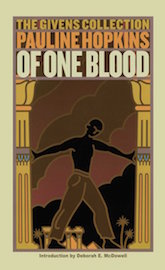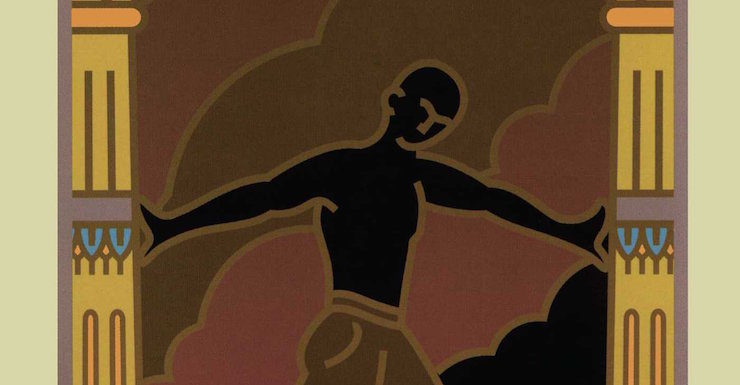In February of 2016, Fantastic Stories of the Imagination published an essay I wrote called “A Crash Course in the History of Black Science Fiction.” Since then, Tor.com has published my in-depth essays on seventeen of the 42 works mentioned. In this eighteenth column I write about a few aspects of a science fiction novel by nineteenth-and-early-twentieth century author Pauline Hopkins, titled Of One Blood.
MERGING STREAMS
 Over the winter of 1902 to 1903, The Colored American Magazine (which Hopkins edited) published chapters of a work blending two popular late-Victorian literary forms: “society” novels of the doings of the upper classes and lost world adventures. Though really a “problem” book, Of One Blood begins more or less in the style of the first. A Boston medical student falls in love with the (white-appearing) soloist of a touring (“colored”) choir, proposes marriage, and is accepted—but the machinations of a rich rival drive him from his wife’s arms to take part in an Ethiopian archaeological expedition.
Over the winter of 1902 to 1903, The Colored American Magazine (which Hopkins edited) published chapters of a work blending two popular late-Victorian literary forms: “society” novels of the doings of the upper classes and lost world adventures. Though really a “problem” book, Of One Blood begins more or less in the style of the first. A Boston medical student falls in love with the (white-appearing) soloist of a touring (“colored”) choir, proposes marriage, and is accepted—but the machinations of a rich rival drive him from his wife’s arms to take part in an Ethiopian archaeological expedition.
Here the Lost World narrative takes over. Hopkins’s hero, Reuel Briggs, himself hiding his own African heritage, discovers a hidden kingdom protected by two merging streams, of which he turns out to be the prodigal king. Unlike the countries discovered in H. Rider Haggard’s famous genre exemplars She and King Solomon’s Mines, though, or dozens of other authors’ similar stories, the inhabitants of this secret land are black. Not only black, but proud proclaimers of blacks’ incomparable historical significance.
ETHIOPIA FOREVER
While camped outside Meroë, Professor Stone, the fictional expedition’s leader, cites the Bible and asserts that “It is a fact” that Egypt’s undeniable greatness derived from Ethiopia. He goes further, pondering the likelihood that negritude is man’s natural condition and whiteness a diseased mutation comparable to leprosy. Declaring the Martin Bernal-esque idea of black civilization’s primacy in audacious fullness, Hopkins has an official of this proto-Wakanda lecture American-born Reuel that from it came “all the arts and cunning inventions that make your modern glory.” A heady thesis, especially for that time—less than forty years post-Civil War.
A TINY TEMPEST IN EGYPT
As I re-read Of One Blood in preparation for writing this essay, I thought many times of my friend K. Tempest Bradford (or @tinytempest, as she’s known on Twitter). At the moment, Tempest is touring Egypt to research the setting of her steampunk novels-in-progress. Tempest’s ancient Egypt is matriarchal, and clearly owes a deep cultural debt to sub-Saharan Africa. And it’s so cool: Female pharaohs! Giant mechanical scarabs! Tempest has shown me exciting excerpts of what she’s working on, and I feel a sympathetic thrill for her—particularly while re-reading what must have been a similarly daring and sensational book, and imagining its reception. Hopkins is in many ways Tempest’s foremother: another African-descended woman using a popular genre to write speculatively about the occult glories of her lineage.
NATURAL AND SUPERNATURAL
The word “occult” appears often throughout Of One Blood. Its synonym “hidden” is part of the book’s subtitle: The Hidden Self. Though these days we tend to identify the term occult with nonscientific traditions, that’s all it means. Hidden. And though these days we tend to identify spiritualism, clairvoyance, and hypnotism—or “mesmerism,” as it was popularly called—with the nonscientific, they were thought quite scientific at the time of this novel’s publication. Like Mary Shelley writing Frankenstein nearly a century before, like Margaret Cavendish writing The Blazing World nearly a century-and-a-half before that, Hopkins drew on and hewed to the scientific teachings of her day as they were understood by contemporary minds. That makes what she wrote science fiction—convenient mysterious birthmarks, biblical quotations, clairvoyance, ghostly apparitions, and all.
SUPERNATURAL AND UNNATURAL
The apparitions are of Mira, an ancestress guiding first Reuel, then his bride Dianthe, through the entanglements of their destiny. Trances—mesmeric or medical in origin—also help hero and heroine find and succor one another, reach their highest potentials, and ultimately triumph over horrific conditions rooted in the era of enslavement so recently past.
Though Reuel passes for white and Dianthe easily could, both are descended from the same African-blooded woman. They are sister and brother. And man and wife.
Incest is one of the suppressed terrors of American chattel slavery. Sometimes it was forced on the “peculiar institution’s” captives in the interest of breeding people like cattle. Sometimes it was the unintentional result of the captors deliberately destroying knowledge of their captives’ lineage. Sometimes it was the awful choice of so-called owners inheriting control of their black kin. Though Of One Blood’s incest is of the second sort, the third was also surely in Hopkins’s mind, because Reuel’s rival for Dianthe’s hand is also the couple’s full brother—as revealed by an aged retainer and confirmed by the aforementioned birthmark.
What remedy did the author see for this criminal legacy? Acknowledgment. Acceptance. Revelation. Acknowledgement and acceptance of our relatedness. Revelation of our equality. All still worthy goals for readers and writers of speculative fiction.
THE FINAL WORD
Race is a social construct. Biologically speaking, it has no defining markers. The members of a given race are often categorized by particular physical features, but genetic outliers will share some of those same features, while closer relatives may not. Witness the difference in treatment between Dianthe and her “white” brothers.
Even without directly referencing the ridiculous “one-drop rule” being instituted across the U.S. during her lifetime, Hopkins points up the intimacy of identity undermining racial boundaries. And as with her repeated exhortations to the public to credit African culture with the wisdom and inventiveness that is its due, she makes the Bible her final authority on the matter. Incest perverts and denies existing ties, and according to Hopkins, God decrees these ties must not be ignored. She ends the novel with a quotation from the Book of Acts, chapter 17, verse 26: “Of one blood have I made all races of men.”
 Nisi Shawl is a writer of science fiction and fantasy short stories and a journalist. She is the author of Everfair (Tor Books) and co-author (with Cynthia Ward) of Writing the Other: Bridging Cultural Differences for Successful Fiction. Her short stories have appeared in Asimov’s SF Magazine, Strange Horizons, and numerous other magazines and anthologies.
Nisi Shawl is a writer of science fiction and fantasy short stories and a journalist. She is the author of Everfair (Tor Books) and co-author (with Cynthia Ward) of Writing the Other: Bridging Cultural Differences for Successful Fiction. Her short stories have appeared in Asimov’s SF Magazine, Strange Horizons, and numerous other magazines and anthologies.










